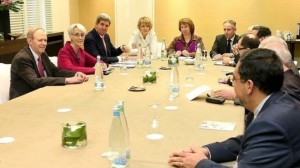 Representatives from Iran and the six world powers during nuclear talks in Geneva, November 9, 2013[/caption]
Representatives from Iran and the six world powers during nuclear talks in Geneva, November 9, 2013[/caption]French Foreign Minister Laurent Fabius, British Foreign Secretary William Hague, and German Foreign Minister Guido Westerwelle will travel to Geneva to join the ongoing talks on Iran�s nuclear energy program.
"Laurent Fabius will get to Geneva overnight for the discussions on the Iranian nuclear issue," a French diplomatic source said on Friday.
Meanwhile, Hague said in a Twitter message that he will join the foreign ministers of the world powers and Iran, who are reportedly moving closer to an accord.
A German government spokesman announced that Westerwelle will also join the US secretary of state and other world power counterparts on Saturday for talks with Iran.
Earlier in the day, US State Department spokeswoman Jen Psaki said that Secretary of State John Kerry will also travel to Geneva �with the goal of continuing to help narrow the differences and move closer to an agreement" with Iran.
The new developments came as Iranian Foreign Minister Mohammad Javad Zarif and European Union foreign policy chief Catherine Ashton held a new meeting on the eve of the fourth day of the talks.
Iran and the five permanent members of the United Nations Security Council -- the United States, France, Britain, Russia and China -- plus Germany kicked off their latest round of talks on Wednesday.
Russian Foreign Minister Sergei Lavrov also arrived in the Swiss city on Friday afternoon and held a meeting with Zarif and later with Ashton.
Chinese Foreign Minister Wang Yi will also head to Geneva to join the negotiations as the talks extend to a fourth day.
Hopes are now rising that a final deal that many say could end the standoff over the Iranian nuclear energy program is just around the corner.
The Iranian delegation has been engaged with one-on-one meetings with other delegations to hammer out an interim deal to pave the ground for the resolution of the West�s decade-old standoff with Iran over its nuclear energy program.
�To a good degree, we have moved (closer) towards agreement,� Iranian Deputy Foreign Minister Seyyed Abbas Araqchi said late on Friday, adding however that "some main issues still remain."
Meanwhile, IRNA news agency quoted an unnamed Western diplomat as saying that the six world powers have accepted the Islamic Republic�s right to enrich uranium.
Earlier in the day, Iran reiterated its right to uranium enrichment, with Zarif saying, �Our right to enrichment is our red line.�
By Press TV
The Iran Project is not responsible for the content of quoted articles.










